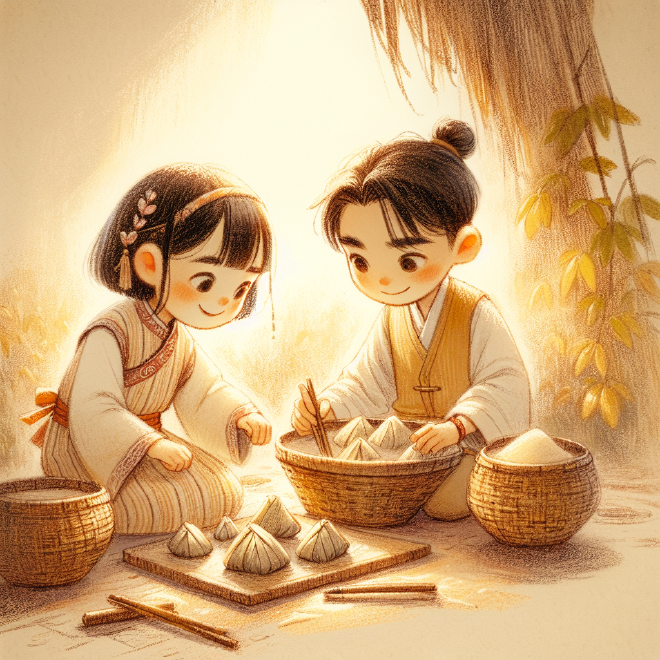猫的报恩

Table of Contents
Audio #
汉字 #
端午节快到了,丽丽非常高兴,因为她可以和奶奶一起包粽子了。丽丽觉得包粽子很好玩,但是她总是包不好。叶子不是放太多米,就是放太少米,包出来的粽子总是松松垮垮的。
奶奶看着丽丽着急的样子,笑着说:“别着急,慢慢来。包粽子要用心,也要有耐心。”奶奶先给丽丽示范了一遍,一步一步地教她。奶奶告诉丽丽,要先拿两片粽叶,叠在一起,做成一个漏斗的形状。然后,放入糯米、红枣和花生。最后,把粽叶包起来,用绳子系紧。
丽丽按照奶奶的方法,小心翼翼地包着。第一次包的粽子还是有点丑,但是比之前的好了很多。奶奶鼓励她说:“很棒!继续努力!” 丽丽听了奶奶的话,更加认真地练习。
经过几次尝试,丽丽终于包出了一个漂亮的粽子。她高兴地举起粽子,给奶奶看。“奶奶,你看!我成功了!” 奶奶笑着点点头:“真棒!丽丽学会了包粽子,端午节我们就可以吃很多粽子了!” 丽丽开心地笑了,她觉得这个端午节会非常特别。
Pinyin #
Duānwǔjié kuài dào le, Lìlì fēicháng gāoxìng, yīnwèi tā kěyǐ hé nǎinai yīqǐ bāo zòngzi le. Lìlì juéde bāo zòngzi hěn hǎowán, dànshì tā zǒngshì bāo bù hǎo. Yèzi bùshì fàng tài duō mǐ, jiùshì fàng tài shǎo mǐ, bāo chūlái de zòngzi zǒngshì sōngsōngkuǎkuǎ de.
Nǎinai kànzhe Lìlì zhāojí de yàngzi, xiàozhe shuō: “Bié zhāojí, mànmàn lái. Bāo zòngzi yào yòngxīn, yě yào yǒu nàixīn.” Nǎinai xiān gěi Lìlì shìfàn le yī biàn, yībù yībù de jiāo tā. Nǎinai gàosù Lìlì, yào xiān ná liǎng piàn zòngyè, dié zài yīqǐ, zuòchéng yī ge lòudǒu de xíngzhuàng. Ránhòu, fàngrù nuòmǐ, hóngzǎo hé huāshēng. Zuìhòu, bǎ zòngyè bāo qǐlái, yòng shéngzi xì jǐn.
Lìlì ànzào nǎinai de fāngfǎ, xiǎoxīn yìyì de bāozhe. Dì yī cì bāo de zòngzi háishi yǒudiǎn chǒu, dànshì bǐ zhīqián de hǎo le hěn duō. Nǎinai gǔlì tā shuō: “Hěn bàng! Jìxù nǔlì!” Lìlì tīng le nǎinai de huà, gèngjiā rènzhēn de liànxí.
Jīngguò jǐ cì chángshì, Lìlì zhōngyú bāo chū le yī ge piàoliang de zòngzi. Tā gāoxìng de jǔ qǐ zòngzi, gěi nǎinai kàn. “Nǎinai, nǐ kàn! Wǒ chénggōng le!” Nǎinai xiàozhe diǎn diǎn tóu: “Zhēn bàng! Lìlì xuéhuì le bāo zòngzi, Duānwǔjié wǒmen jiù kěyǐ chī hěn duō zòngzi le!” Lìlì kāixīn de xiào le, tā juéde zhège Duānwǔjié huì fēicháng tèbié.
English Translation #
The Dragon Boat Festival is approaching, and Lili is very happy because she can make zongzi with her grandma. Lili thinks making zongzi is fun, but she can’t seem to get it right. She either puts too much rice or too little rice, and the zongzi she makes are always loose.
Grandma, seeing Lili’s anxious expression, smiled and said, “Don’t worry, take your time. Making zongzi requires care and patience.” Grandma first demonstrated it to Lili, teaching her step by step. Grandma told Lili to first take two zongzi leaves, fold them together, and make a funnel shape. Then, put in glutinous rice, red dates, and peanuts. Finally, wrap the zongzi leaves and tie them tightly with string.
Lili carefully wrapped the zongzi according to her grandma’s method. The first zongzi she made was still a bit ugly, but much better than before. Grandma encouraged her, “Great! Keep up the good work!” Lili listened to her grandma and practiced even more seriously.
After several attempts, Lili finally made a beautiful zongzi. She happily held up the zongzi and showed it to her grandma. “Grandma, look! I succeeded!” Grandma smiled and nodded, “Great! Lili has learned to make zongzi, so we can eat a lot of zongzi during the Dragon Boat Festival!” Lili smiled happily, feeling that this Dragon Boat Festival would be very special.
Grammatical Points and Analysis #
Adverbs of Degree: #
- 非常 (fēicháng): very, extremely. Used to modify adjectives and express a high degree of something. Example: 非常高兴 (fēicháng gāoxìng) - very happy.
- 总是 (zǒngshì): always. Indicates something happens frequently or consistently. Example: 总是包不好 (zǒngshì bāo bù hǎo) - always can’t wrap well.
- 更加 (gèngjiā): even more. Used for comparisons to show a higher degree. Example: 更加认真 (gèngjiā rènzhēn) - even more seriously.
- 有点 (yǒudiǎn): a little. Indicates a slight degree. Example: 有点丑 (yǒudiǎn chǒu) - a little ugly.
Directional Complements: #
- 出来 (chūlái): out. Often indicates the result of an action. Example: 包出来 (bāo chūlái) - to wrap out/ to produce by wrapping.
- 起来 (qǐlái): indicates an upward movement; it also indicates the beginning or continuation of an action. Example: 包起来 (bāo qǐlái) - to wrap up.
Resultative Complements: #
- 好 (hǎo): indicates the action is completed to a satisfactory state. Example: 学好(xué hǎo) to learn well; 包不好 (bāo bù hǎo) - not wrapping well.
- 紧 (jǐn): tight. Example: 系紧 (xì jǐn) - tie tightly.
Time Phrases: #
- 端午节快到了 (Duānwǔjié kuài dào le): The Dragon Boat Festival is approaching.快到了 (kuài dào le) indicates that something is approaching.
Sentence Structures: #
- 不是…就是… (bùshì…jiùshì…): If not… then… This structure expresses two options or possibilities. Example: 叶子不是放太多米,就是放太少米 (Yèzi bùshì fàng tài duō mǐ, jiùshì fàng tài shǎo mǐ) - She either puts too much rice or too little rice.
- 终于 (zhōngyú): finally, eventually. Used to indicate something happened after a period of time or effort. Example: 终于包出了 (zhōngyú bāo chūle) - finally wrapped out.
連词 (liáncí - conjunction): #
- 然后 (ránhòu): then.
Questions #
丽丽一开始为什么包不好粽子? (Lìlì yī kāishǐ wèishénme bāo bù hǎo zòngzi?) Why couldn’t Lili wrap the zongzi well at the beginning?
Click to show the answer
Answer: #
丽丽一开始包不好粽子,因为她放太多米或者太少米,包出来的粽子总是松松垮垮的。(Lìlì yī kāishǐ bāo bù hǎo zòngzi, yīnwèi tā fàng tài duō mǐ huòzhě tài shǎo mǐ, bāo chūlái de zòngzi zǒngshì sōngsōngkuǎkuǎ de.) Lili couldn’t wrap the zongzi well at the beginning because she put too much rice or too little rice, and the zongzi she made were always loose.
奶奶是怎么教丽丽包粽子的?(Nǎinai shì zěnme jiāo Lìlì bāo zòngzi de?) How did Grandma teach Lili to wrap zongzi?
Click to show the answer
Answer: #
奶奶先给丽丽示范了一遍,一步一步地教她。奶奶告诉丽丽要先拿两片粽叶,叠在一起,做成一个漏斗的形状,然后放入糯米、红枣和花生,最后把粽叶包起来,用绳子系紧。(Nǎinai xiān gěi Lìlì shìfàn le yī biàn, yībù yībù de jiāo tā. Nǎinai gàosù Lìlì yào xiān ná liǎng piàn zòngyè, dié zài yīqǐ, zuòchéng yī ge lòudǒu de xíngzhuàng, ránhòu fàngrù nuòmǐ, hóngzǎo hé huāshēng, zuìhòu bǎ zòngyè bāo qǐlái, yòng shéngzi xì jǐn.) Grandma first demonstrated it to Lili, teaching her step by step. Grandma told Lili to first take two zongzi leaves, fold them together to make a funnel shape, then put in glutinous rice, red dates, and peanuts, and finally wrap the zongzi leaves and tie them tightly with string.
Disclaimer: This story is purely fictional and generated by AI. Any similarities to real people, places, or events are purely coincidental.